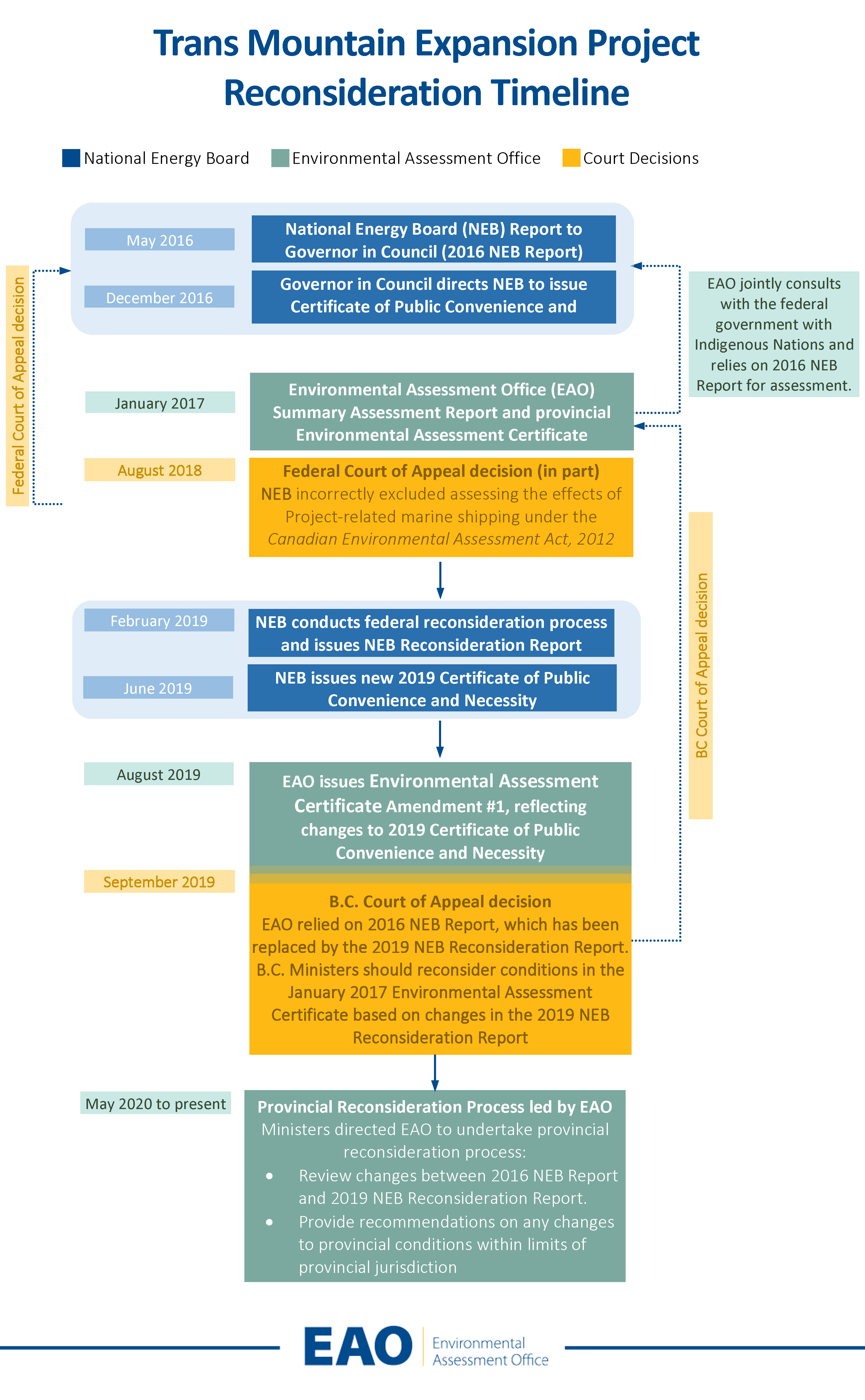Detailed History of how the Province arrived at the Trans Mountain Expansion Project Reconsideration
- In 2013, Trans Mountain Pipeline ULC (Trans Mountain) applied to the National Energy Board (NEB) for a Certificate of Public Convenience and Necessity (CPCN).
- In 2016, Coastal First Nations v. British Columbia (Minister of Environment), 2016 B.C. Supreme Court 34, the British Columbia Supreme Court held that a portion of the NEB-EAO Equivalency Agreement was invalid. Specifically, the Court ruled that, although ministers may rely on the environmental assessment carried out by the NEB, the Equivalency Agreement cannot dispense with the requirement for an EA Certificate under the provincial Environmental Assessment Act.
- In 2016, the EAO ordered that the Project required an EA Certificate. The EAO proceeded to jointly consult with the federal government with Indigenous nations and rely on the 2016 NEB Report.
- On December 1, 2016 the and the NEB issued Certificate of Public Convenience and Necessity (CPCN) OC-064 for the Project with 157 conditions.
- Trans Mountain received a Provincial Environmental Assessment Certificate (EA Certificate) for the Project on January 10, 2017, relying on the assessment conducted by the NEB.
- On August 30, 2018, the Federal Court of Appeal quashed the federal approval of the Project in part because, in the Court’s view, the NEB unjustifiably excluded Project-related marine shipping from the scope of the “designated project” reviewed under the Canadian Environmental Assessment Act, 2012 (CEAA 2012). The NEB was directed to reconsider aspects of the 2016 Report related to the application of CEAA 2012 and the Species at Risk Act to Project-related marine shipping.
- On February 22, 2019, the NEB delivered its Reconsideration Report to the Government of Canada, with an overall recommendation that the Project is in the Canadian public interest and should be approved.
- After reconsideration by the Governor in Council and the NEB, a new federal certificate (CPCN OC-065) was issued on June 21, 2019 with 156 conditions The NEB confirmed Condition 151, amended Conditions 2, 91, 132, 133, 134, and 144, and removed Condition 131 (Marine Public Outreach Program), but provided it as a recommendation to the federal government. The NEB included 16 recommendations to the GIC for measures to mitigate, avoid, or lessen the effects of Project-related marine shipping that the NEB stated are beyond the scope of its regulatory authority or Trans Mountain’s control, but within the authority of the federal government. In the recitals to the Order in Council issued on September 20, 2018 the GIC undertook to implement all the recommendations.
- Trans Mountain applied to the EAO to amend the Project’s EA Certificate to reflect the new federal certificate. On August 28, 2019 the EAO approved the amendment to maintain consistency between the EA Certificate conditions and the CPCN conditions.
- Judicial reviews challenging the EA Certificate by the City of Vancouver and the Squamish Nation were dismissed by the Supreme Court of British Columbia.
- The City of Vancouver and the Squamish Nation appealed those decisions to the B.C. Court of Appeal (BCAA).
- The BCCA decisions on September 17, 2019, upheld most aspects of the provincial environmental assessment process (meaning the EA Certificate remains valid) but concluded that the Minister of Environment and Climate Change Strategy and then Minister of Energy, Mines and Petroleum Resources (Ministers) must consider whether there are implications for the EA Certificate arising from the NEB’s Reconsideration Report.
- Provincial Ministers have directed the EAO to undertake a provincial reconsideration process, consistent with direction from the BCCA, to identify and consider portions of the NEB’s Reconsideration Report that differ from the initial NEB Report and to provide recommendations regarding any new or amended EAC conditions in response to those portions, within the limits of provincial jurisdiction.
- As part of the reconsideration process, the Ministers directed that the EAO engage and work closely with Squamish Nation, Tsleil-Waututh Nation, and the City of Vancouver. The EAO has also engaged with Trans Mountain Pipeline ULC, provincial and federal government agencies, and other parties.
- The EAO’s draft report identifies the portions of the NEB’s Reconsideration Report that differ from the initial NEB report that relate to areas of provincial interest and jurisdiction, the related concerns and views expressed during engagement, EAO’s analysis of the changes (in consideration of the engagement undertaken), and recommendations regarding any new or amended EAC conditions.
- It is this draft EAO reconsideration report that the EAO is seeking feedback on, which will inform the final report that goes to Provincial Ministers for a decision.

